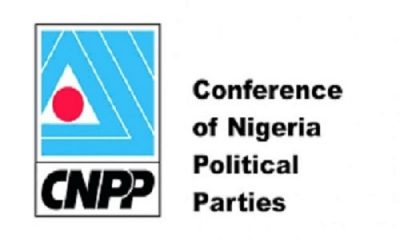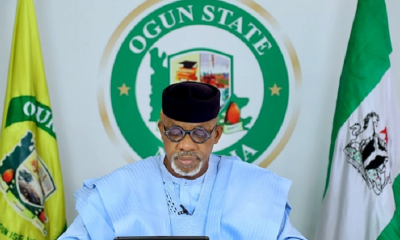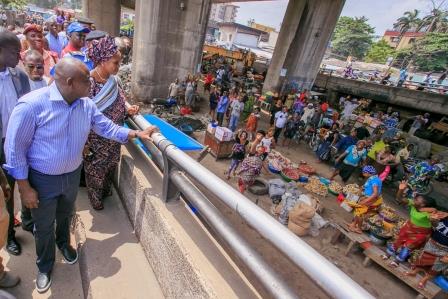Economy
We’ve Attracted $30bn in Foreign Direct Investment in Nine Months—Tinubu

By Adedapo Adesanya
President Bola Tinubu says his nine-month-old administration has attracted $30 billion in Direct Foreign Investment (FDI) commitments to shore up the Nigerian economy.
Mr Tinubu said this at the 2023 Leadership Annual Conference and Award on Tuesday in Abuja themed An Economy in Distress: The Way Forward, organised by the Leadership Group, publishers of Leadership Newspapers.
Mr Tinubu, represented by Minister of Information and National Orientation, Mr Mohammed Idris, conveyed that the Nigerian economy is not in distress, but facing challenging times.
He explained that despite the challenging situation, the country has attracted unprecedented opportunities to reset the course and build a new and sustainable economy away from the rent-seeking and the waste that was once the order of the day.
“Since we assumed office in May 2023, we have attracted $30 billion in Foreign Direct Investment (FDI) commitments into the real sectors of the economy, including manufacturing, telecoms, healthcare, oil and gas, and others.
“Those investments have already started coming into the country. Just a few days ago, I was in Qatar on an official visit, where the Emir assured me that a senior government delegation would visit Nigeria after Ramadan.
“I have asked the Minister of Finance and Coordinating Minister of the Economy to directly interface with the Qatari authorities to ensure that speedy progress is made.
“The Nigerian economy saw a better than anticipated performance in the last quarter of 2023, growing by 3.46 per cent, compared with 2.54 per cent in the preceding quarter.
“Capital Importation into Nigeria was up by 66 per cent in Q4 2023, reversing a 36 per cent decline in the previous quarter.
“In January 2024, the Nigerian Exchange All Share Index (ASI) crossed the 100,000 points mark, its highest ever.
“There is no one who looks at this data who will conclude that ‘distressed’ is the accurate way to describe the Nigerian economy,” Mr Tinubu said.
He emphasised that these were the outcomes of ongoing reforms.
Mr Tinubu, however, said the government was aware of the hardships due to the reform, but assured that a lot of efforts and energy were being made towards alleviating the pains and setting the economy on firm footing.
“There are incredible opportunities for investment in every sector of the economy, as the Federal Government stabilise our foreign exchange market and macroeconomic indices.
“I ask for the continuing patience and support of all Nigerians, including the elite that is very well represented in this room today.”
The President also sought for understanding of the media as the government continues the reform of the economy.
“To the Nigerian media, I urge you to strive to report not only the challenges but also the solutions and the opportunities as well.
“Ours is a story of a country that is taking the right steps, and feeling the fleeting pains that will come with this course of action. A glorious dawn is indeed assured.
“Since the removal of petrol subsidies, our imports of petrol have dropped by about 50 per cent, which translates to roughly one billion liters of petrol every month, according to the National Bureau of Statistics,” Mr Tinubu said.
The president added that the revenues accruing to the three tiers of government – federal, state and local – had grown by between 50 per cent and 100 per cent since the removal of the petrol subsidy.
“This means more funds are available to directly impact the lives of Nigerians through investments in critical infrastructure, social security, and other areas.
“For example, the additional funding we are receiving is going into a new minimum wage for which negotiations have started, between the federal and state governments and organized labour.
“I have approved the disbursement of N200 billion, through three new special intervention funds established to support Nigerian businesses.
“The first is a N50 billion Presidential Conditional Grant Scheme that will provide business grants and loans to traders, food vendors, transport workers, ICT businesses, creatives, and artisans. Verification of all submitted applications is ongoing, and disbursements will commence through the Bank of Industry as soon as this verification is completed.
“The second is a N75 billion MSME Intervention Fund which will provide single-digit-interest loans to our MSMEs.
“The third is another N75 billion Manufacturing Sector Fund targeting manufacturing businesses, with selected beneficiaries eligible to access up to N1 billion each,” Mr Tinubu said.
Economy
Seven Price Gainers Boost NASD OTC Bourse by 2.19%

By Adedapo Adesanya
Seven price gainers flipped recent declines at the NASD Over-the-Counter (OTC) Securities Exchange, raising the alternative stock market by 2.19 per cent on Friday.
According to data, the market capitalisation added N51.24 billion to end N2.389 trillion compared with the previous day’s N2.338 trillion, while the NASD Unlisted Security Index (NSI) climbed 85.65 points to close at 3,994.32 points, in contrast to the 3,908.67 points it ended a day earlier.
Business Post reports that the advancers were led by MRS Oil Plc, which improved its value by N13.00 to N200.00 per share from N187.00 per share, FrieslandCampina Wamco Nigeria Plc gained N7.40 to settle at N91.55 per unit versus the previous day’s N84.15 per unit, Central Securities Clearing System (CSCS) Plc appreciated by N6.08 to N71.00 per share from N64.92 per share, Afriland Properties Plc added 66 Kobo to finish at N17.17 per unit versus N16.51 per unit, IPWA Plc rose 37 Kobo to N4.15 per share from N3.78 per share, First Trust Mortgage Bank Plc grew by 11 Kobo to N1.20 per unit from N1.09 per unit, and Food Concepts Plc went up by 10obo to N3.70 per share from N3.60 per share.
On the flip side, there were two price losers led by Geo-Fluids Plc, which depreciated by 28 Kobo to N3.32 per unit from N3.60 per unit, and Industrial and General Insurance (IGI) Plc dropped 5 Kobo to sell at 45 Kobo per share from 50 Kobo per share.
Yesterday, the volume of trades went down by 92.0 per cent to 3.7 million units from 45.8 million units, the value of transactions fell by 59.4 per cent to N84.5 million from N208.2 million, while the number of deals went up by 7.7 per cent to 42 deals from 39 deals.
CSCS Plc remained the most traded stock by value (year-to-date) with 32.6 million units exchanged for N1.9 billion, trailed by Geo-Fluids Plc with 119.6 million units valued at N470.3 million, and Resourcery Plc with 1.05 billion units traded at N408.6 million.
Resourcery Plc closed the day as the most traded stock by volume (year-to-date) with 1.05 billion units sold for N408.7 million, followed by Geo-Fluids Plc with 119.6 million units worth N470.3 million, and CSCS Plc with 32.6 million units worth N1.9 billion.
Economy
FX Demand Worries Weaken Naira to N1,346/$1 at Official Market

By Adedapo Adesanya
The Naira weakened further against the United States Dollar in the Nigerian Autonomous Foreign Exchange Market (NAFEX) on Friday, February 20, by N4.97 or 0.37 per cent to N1,346.32/$1 from the N1,341.35/$1 it was transacted on Thursday.
Heightened FX demand tilted the market toward the downside yesterday, exerting upward pressure on rates despite efforts by the Central Bank of Nigeria (CBN) to stabilise the foreign exchange market.
Also in the official market, the domestic currency depreciated against the Pound Sterling during the session by N9.39 to sell for N1,815.25/£1 versus the previous day’s N1,805.86/£1, and lost N7.33 against the Euro to close at N1,584.62/€1 compared with the preceding session’s N1,577.29/€1.
The story was not different for the Nigerian Naira at the GTBank FX desk, where it depleted against the Dollar by N7 on Friday to quote at N1,356/$1 versus the N1,349/$1 it was sold a day earlier, but remained unchanged in the black market at N1,370/$1.
It was observed that risky sentiment among Foreign Portfolio Investors (FPIs) contributed to the FX market, amid fears of hot money flight due to capital gains tax and other factors.
As for the cryptocurrency market, it was mostly green yesterday in reaction to a Supreme Court verdict dismissing a fresh 10 per cent global levy by President Donald Trump.
The apex court on Friday described Mr Trump’s global tariff rollout as illegal. The decision did not clarify what should happen to tariff revenue already collected, and it doesn’t necessarily spell the end of the trade agenda, with multiple legal and executive avenues still available.
Litecoin (LTC) grew 2.7 per cent to $55.00, Cardano (ADA) appreciated 2.6 per cent to trade at $0.2815, Binance Coin (BNB) expanded by 2.6 per cent to $627.19, Dogecoin (DOGE) recouped 1.3 per cent to quote at $0.1, Ripple (XRP) jumped 0.7 per cent to $1.43, Solana (SOL) improved by 0.5 per cent to $84.15, and Ethereum (ETH) soared 0.1 per cent to $1,962.78.
However, Bitcoin (BTC) lost 0.2 per cent to sell for $67,850.49, while the US Dollar Tether (USDT) and the US Dollar Coin (USDC) traded flat at $1.00 each.
Economy
Fidson, Jaiz Bank, Others Keep NGX in Green Territory

By Dipo Olowookere
A further 0.99 per cent was gained by the Nigerian Exchange (NGX) Limited on Friday after a positive market breadth index supported by 53 price gainers, which outweighed 23 price losers, representing bullish investor sentiment.
During the trading day, the trio of Jaiz Bank, Fidson, and NPF Microfinance Bank chalked up 10.00 per cent each to sell for N11.00, N86.90, and N6.27, respectively, while Deap Capital appreciated by 9.96 per cent to N7.62, and Mutual Benefits increased by 9.94 per cent to N5.42.
Conversely, Secure Electronic Technology shed 10.00 per cent to trade at N1.62, Sovereign Trust Insurance slipped by 9.73 per cent to N2.32, Ellah Lakes declined by 7.91 per cent to N12.80, International Energy Insurance retreated by 5.56 per cent to N3.40, and ABC Transport moderated by 5.26 per cent to N9.00.
Data from Customs Street revealed that the insurance counter was up by 2.52 per cent, the industrial goods sector grew by 2.28 per cent, the banking space expanded by 1.43 per cent, the consumer goods index gained 1.23 per cent, and the energy industry rose by 0.05 per cent.
As a result, the All-Share Index (ASI) went up by 1,916.20 points to 194,989.77 points from 193,073.57 points, and the market capitalisation moved up by N1.230 trillion to N125.164 trillion from Thursday’s N123.934 trillion.
Yesterday, investors traded 820.5 million stocks valued at N28.3 billion in 63,507 deals compared with the 898.5 million stocks worth N38.5 billion executed in 61,953 deals, showing a jump in the number of deals by 2.51 per cent, and a shortfall in the trading volume and value by 8.68 per cent and 26.49 per cent apiece.
Closing the session as the most active equity was Mutual Benefits with 79.0 million units worth N427.1 million, Zenith Bank traded 44.0 million units valued at N3.8 billion, Chams exchanged 43.9 million units for N182.0 million, AIICO Insurance transacted 42.4 million units valued at N179.8 million, and Veritas Kapital sold 36.0 million units worth N90.6 million.
-

 Feature/OPED6 years ago
Feature/OPED6 years agoDavos was Different this year
-
Travel/Tourism10 years ago
Lagos Seals Western Lodge Hotel In Ikorodu
-

 Showbiz3 years ago
Showbiz3 years agoEstranged Lover Releases Videos of Empress Njamah Bathing
-

 Banking8 years ago
Banking8 years agoSort Codes of GTBank Branches in Nigeria
-

 Economy3 years ago
Economy3 years agoSubsidy Removal: CNG at N130 Per Litre Cheaper Than Petrol—IPMAN
-

 Banking3 years ago
Banking3 years agoSort Codes of UBA Branches in Nigeria
-

 Banking3 years ago
Banking3 years agoFirst Bank Announces Planned Downtime
-

 Sports3 years ago
Sports3 years agoHighest Paid Nigerian Footballer – How Much Do Nigerian Footballers Earn

















